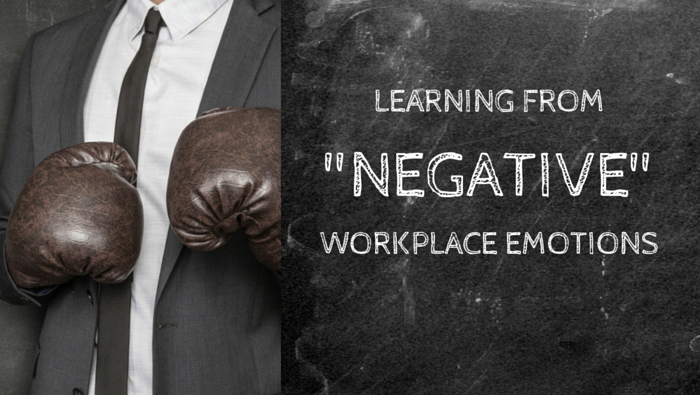![]()
My leadership blog is all about helping current and emerging leaders learn how to transform difficult conversations and dysfunctional workplace relationships into positive and productive ones.


Learning from “Negative” Workplace Emotions
Typically, when people think of the benefits of a passionate workplace, they get a picture of them stemming from people who are brimming with smiles, positivity and energetic collaboration.
/
However, you and your organization can also benefit from high intensity, “negative” workplace emotions — the “dark side” of passion.
/
/
In his recent HBR article, How to Build a Passionate Company, Jim Whitehurst, CEO of Red Hat, talks about 5 ways to foster the kind of passion that fuels great performance.
/
The first one on his list is the importance of letting people show their emotions at work. Jim says:
/
“We often use the term “emotional” like it’s a bad word, especially when it comes to the workplace. But inspiration, enthusiasm, motivation, and excitement are emotions too. If you ask your people to check their emotions (both the good and the bad) at the door, you can’t tap into their passion.”
/
I couldn’t agree more, Jim!
/
Imagine one of your staff members has a real bee in their bonnet – they’re shouting, angry and defiant, being as loud and unyielding as a dog with a bone.
/
Now, let’s be honest, no one likes to be yelled at (or bitten). When you’re on the receiving end of such tirades, it’s the fight or flight response that typically kicks in.
/
However, it’s just this kind of situation that calls on you to bring your “A” game as a leader/manager and craft a more thoughtful, measured response.
/
Today, however, I’m not going to get into how to react effectively in such situations.
/
Instead, let’s consider what you can learn, in general, when someone on your staff feels compelled to express themselves this way.
/
/
People don’t get passionate about things they don’t care about.
/
And, with the kind of outburst we’re talking about here, they’re demonstrating they care about one of two things:
/
⇒ the organization
⇒ themselves
/
/
The Organization:
/
If they’re talking about the work, i.e. why something either has to be done or shouldn’t be done, they’re likely getting frustrated because they feel their viewpoint isn’t being heard, considered or understood. They believe so strongly on how the issue effects the organization that they’re willing to go to battle.
/
So, it’s important not to get triggered by the anger and defiance. If you remain calm and open, you can fully take in the content of what they’re saying. If you don’t, you could be letting the emotion that’s coming at you blind you to something that really is crucial to your organization’s well being.
/
/
Themselves:
/
If the person is talking about her/himself, it’s critical not to get triggered and just write off what they’re saying as griping. Whether the content of what they’re saying has merit or not, the first thing to remember here is that you likely have a staff member who isn’t happy and is feeling disengaged.
/
If you let your empathy be hijacked, you’ll never find out if their complaints have any merit and your staff member will continue to have a negative impact on the overall working climate and productivity.
/
/
So, the next time one of your staff members exhibits the “dark side” of passion, commit to finding out what it is they’re trying to shine a light on.
/
Have an enjoyable and productive day!
/
— Brie
/
P.S. My thanks to Jennifer Cross, who shared Jim’s article with me via LinkedIn … with passion.
Blog Post

Learning from “Negative” Workplace Emotions
Typically, when people think of the benefits of a passionate workplace, they get a picture of them stemming from people who are brimming with smiles, positivity and energetic collaboration.
/
However, you and your organization can also benefit from high intensity, “negative” workplace emotions — the “dark side” of passion.
/
/
In his recent HBR article, How to Build a Passionate Company, Jim Whitehurst, CEO of Red Hat, talks about 5 ways to foster the kind of passion that fuels great performance.
/
The first one on his list is the importance of letting people show their emotions at work. Jim says:
/
“We often use the term “emotional” like it’s a bad word, especially when it comes to the workplace. But inspiration, enthusiasm, motivation, and excitement are emotions too. If you ask your people to check their emotions (both the good and the bad) at the door, you can’t tap into their passion.”


